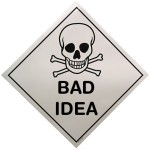Just before the housing and financial markets crashed, Countrywide was advertising a 103% mortgage. They would literally give you all the money needed to buy a house and loan you the closing costs too. Borrowers had no skin in the game. It shouldn’t come as a shock that many of these loans defaulted.
Fast forward to today and it appears that we quickly forgot many of the lessons of the crisis. It’s 2016, Countrywide was purchased by Bank of America and now Bank of America is rolling out its 97% financing “Affordable Loan Solution” home mortgage product.
Don’t get me wrong. Helping homeowners get started on their first home is a laudable goal. My ex-wife purchased her first home thanks to a Maine State Housing Authority 5% down product. (She never missed a payment.)
Banks no longer hold loans. Most are packaged and sold into securitized trust instruments. The only way the bank makes its money is through commissions. Ditto for the loan officers who work for the lenders. There is a huge incentive to close loans and get people into houses… often houses they can’t afford.
We worry that lenders are once again getting sloppy on their underwriting standards. The 3% down makes that even easier to do. Builders pay kickbacks so that homeowner need not pay anything. Everyone wins, or do they?
According to statistics from the last crisis, those folks with little invested in their home had much higher default rates. Since the meltdown, the two biggest mortgage guaranty agencies – Fannie Mae and Freddie Mac – have both been put under federal conservatorship. That means our tax dollars are on the line.
Unfortunately, we are firm believers in the theory that history repeats itself. Already we are hearing rumblings from those in the lending industry of shoddy underwriting, bad appraisals and large scale kickbacks.
These schemes are illegal, of course, but how do we stop a repeat of 2007 – 2008? The answer may surprise you, whistleblowers!
The federal False Claims Act has been on the books since 1863 but 99.9% of Americans have never heard of this law. The False Claims Act allows a whistleblower to file a lawsuit in the name of the government against wrongdoers. If the suit is successful, the whistleblower earns an award based on a percentage of the recovery.
The housing meltdown resulted in over $100 billion in fines against big banks and hundreds of millions of dollars in whistleblower awards. Our clients received over $100 million!
False Claims Act and Whistleblower Awards
Whistleblower are much smarter this time. Greed and corporate arrogance have helped Wall Street forget the lessons of the crash. But insiders remember the stories of huge whistleblower awards. That is good, but it carries some risks too.
This time, would be whistleblowers are much quicker in coming forward. Since the False Claims Act has a “first to file” bar, those who want an award shouldn’t wait too long.
To qualify, you must have inside or original source information about fraud involving government funds or programs. FHA loans have always been subject to the False Claims Act but since 2009, Fannie and Freddie are also included.
Receiving an award involves filing a sealed lawsuit in federal court. That sounds like a hassle but we advance the costs and only charge a fee if there is a recovery. In other words, if there is no recovery you owe nothing.
Interested in joining the increasing numbers of new American heroes? Give us a call. All inquiries are subject to the attorney – client privilege and kept strictly confidential. For more information, contact attorney Brian Mahany at or by phone at (direct).
(Feel free to visit our financial fraud whistleblower page too.)
MahanyLaw – America’s Whistleblower Lawyers


